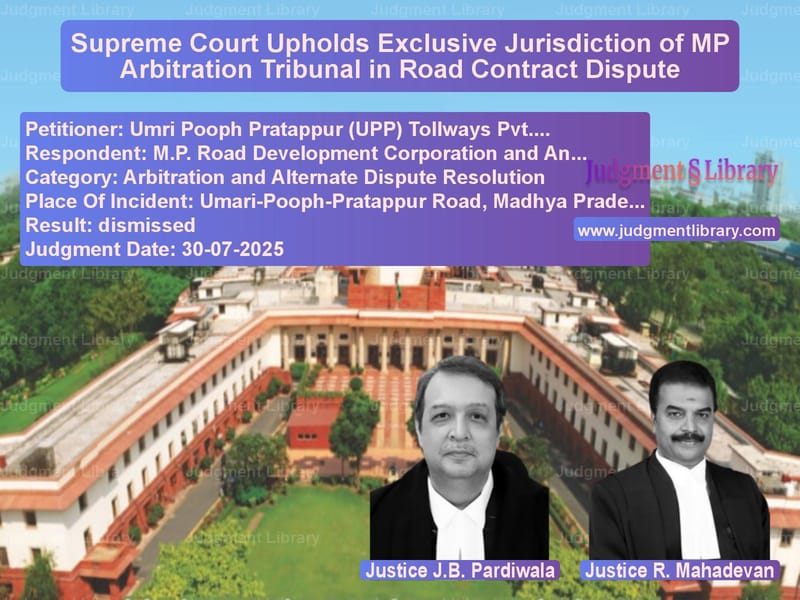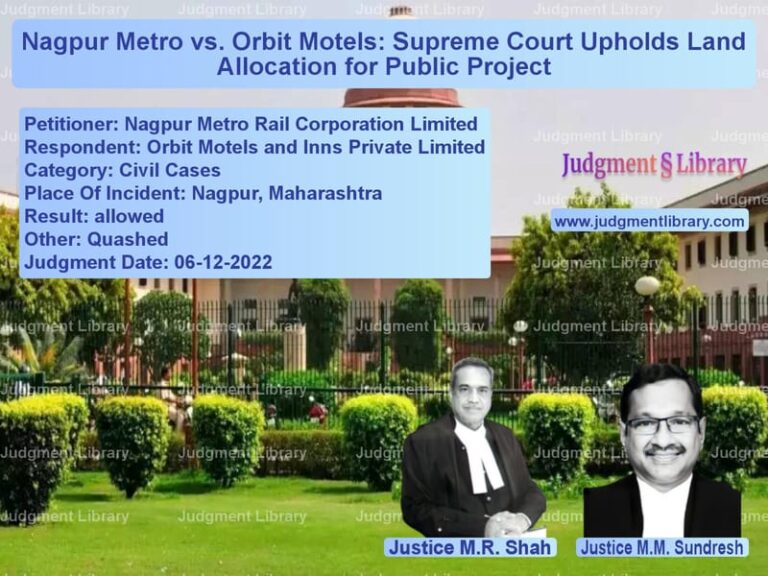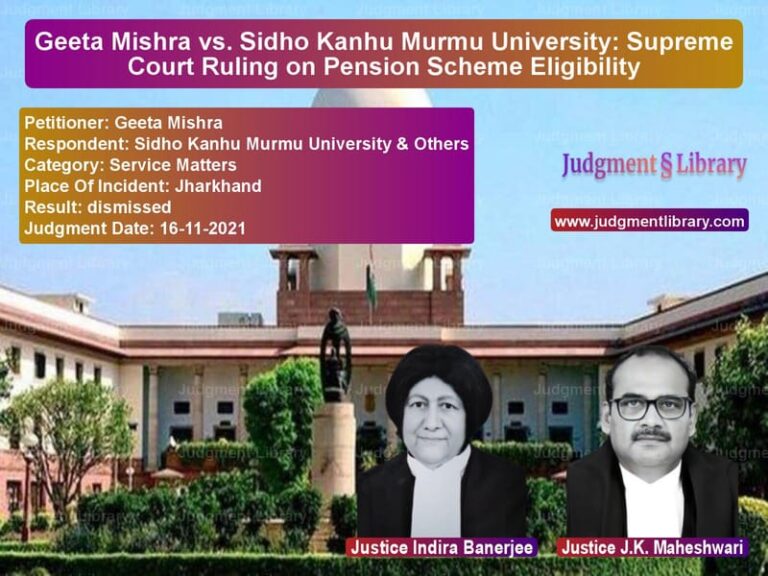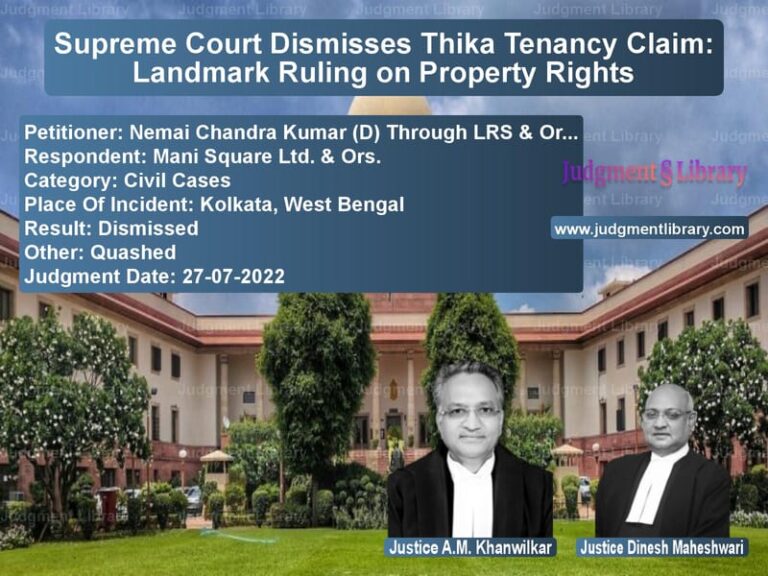Supreme Court Upholds Exclusive Jurisdiction of MP Arbitration Tribunal in Road Contract Dispute
In a significant ruling that clarifies the jurisdictional boundaries between statutory arbitration tribunals and private arbitration mechanisms, the Supreme Court of India has upheld the exclusive jurisdiction of the Madhya Pradesh Arbitration Tribunal over disputes arising from works contracts involving state entities. The judgment, delivered on July 30, 2025, resolves a long-standing legal battle between Umri Pooph Pratappur (UPP) Tollways Pvt. Ltd. and the Madhya Pradesh Road Development Corporation concerning a road development project worth Rs. 73.68 crores.
The dispute originated from a Concession Agreement dated January 5, 2012, for the development of the Umari-Pooph-Pratappur Road on a Build, Operate and Transfer (BOT – Toll + Annuity) basis. The appellant, UPP Tollways, claimed various breaches of contractual obligations by the respondent corporation, leading to the escalation of the total project cost to Rs. 99.80 crores and subsequent claims amounting to Rs. 280.1566 crores.
The appellant’s senior counsel argued vehemently that “the writ petition filed by Respondent No. 1 before the High Court was not maintainable as the appellant is a private company and does not function as an instrumentality of the State.” He further contended that “the arbitration proceedings were initiated by the appellant under the Arbitration and Conciliation Act, 1996, strictly in accordance with Clause 44.3.1 of the Concession Agreement dated 05.01.2012, and not as an alternative or secondary remedy.”
The appellant’s counsel emphasized that “if the parties had intended to refer disputes to the Tribunal under the 1983 Act, the agreement would have specifically provided for such reference. Whereas, Clause 44.3.1 of the Concession Agreement mandates arbitration under the aegis of ICADR, New Delhi.” He also argued that the 1996 Act “is a self-contained and exhaustive code, based on the UNCITRAL Model Law, enacted with the objective of promoting speed, efficiency, and uniformity in arbitral proceedings.”
On the other side, the learned Solicitor General of India appearing for Respondent No.1 presented compelling arguments supporting the exclusive jurisdiction of the Madhya Pradesh Arbitration Tribunal. He submitted that “Respondent No.1 is a wholly owned entity of the State of Madhya Pradesh, and that any Concession Agreement executed by it falls within the ambit of a ‘works contract’ under Section 2(1)(i) of the 1983 Act. Section 7(1) provides for mandatory reference of such disputes to the Madhya Pradesh Arbitration Tribunal, notwithstanding any arbitration clause in the agreement.”
The Solicitor General further argued that “contractual terms cannot override statutory mandates. If a statute designates a specific forum for adjudication, parties cannot, by mutual agreement, confer jurisdiction on an alternate forum. Clause 44.3.1 of the Concession Agreement, to the extent that it provides for private arbitration, is void ab initio in the context of a works contract governed by the 1983 Act.”
The Supreme Court, in its detailed analysis, examined the statutory framework of the Madhya Pradesh Madhyastham Adhikaran Adhiniyam, 1983, and observed that “Section 2(1)(i) of the 1983 Act defines ‘works contract’ to expressly include concession agreements executed by the State or its instrumentalities, regardless of whether direct financial support from the State is involved. Section 7 clearly mandates that all disputes arising from such works contract shall be referred to the Madhya Pradesh Arbitration Tribunal, even if the agreement contains an arbitration clause to refer the dispute under any enactment.”
The court extensively referred to the Full Bench decision of the Madhya Pradesh High Court in Viva Highways Ltd., which had been affirmed by the Supreme Court. The court noted that “where an agreement qualifies as a ‘works contract’ under Section 2(1)(i) of the 1983 Act, and the dispute falls within the scope of Section 2(1)(d), the reference to the Madhya Pradesh Arbitration Tribunal constituted under Section 3 of the 1983 Act is mandatory, notwithstanding the presence of any arbitration clause in the agreement.”
The Supreme Court made a crucial observation regarding the nature of the claims, stating that “the list of claims filed by the appellant clearly discloses a quantified monetary claim of Rs.280.1566 crores, which was specifically pleaded in the reference petition. This squarely falls within the definition of ‘dispute’ under Section 2(1)(d) of the 1983 Act, which includes both ascertained and ascertainable monetary claims.”
The court further reinforced the legal position established in previous judgments, noting that “in M.P. Rural Road Development Authority v. L.G. Chaudhary Engineers & Contractors, a three-Judge Bench of this Court reaffirmed that in the context of a ‘works contract’ in Madhya Pradesh, the 1983 Act has overriding effect over the 1996 Act.”
Addressing the appellant’s conduct, the court observed that “the appellant’s conduct in withdrawing the reference petition before the Madhya Pradesh Arbitration Tribunal, without seeking liberty to re-agitate the claims, and simultaneously initiating proceedings under the 1996 Act, constitutes forum shopping. This conduct, aimed at circumventing the statutory mechanism and reviving abandoned claims, is tainted with mala fides and deserves to be deprecated.”
The Supreme Court also addressed the limitation aspect, noting that “the appellant’s claims – which arise from events dating back to 2013-2015 – are also barred by limitation under Section 43 of the 1996 Act read with the Limitation Act, 1963. The belated invocation of arbitration in 2022, and its continuation in 2025, is thus clearly time-barred and legally unsustainable.”
In its concluding remarks, the court emphasized the fundamental principle that “parties cannot contract out of a statutory obligation enacted in furtherance of public interest.” Quoting from Booz Allen & Hamilton Inc. v. SBI Home Finance Ltd., the court reiterated that “arbitration is not permissible where the legislature has reserved adjudication of disputes to a special forum.”
However, in a balanced approach considering the interests of justice, the Supreme Court provided the appellant with a final opportunity to seek restoration of its original reference before the Madhya Pradesh Arbitration Tribunal. The court directed that “the appellant can be permitted to seek revival of Reference Petition No.61 of 2018 before the Madhya Pradesh Arbitration Tribunal” and specified timelines for filing the restoration application and subsequent disposal of the matter.
This judgment serves as an important precedent reinforcing the supremacy of statutory dispute resolution mechanisms over contractual arbitration clauses in matters involving state entities and works contracts. It clarifies that specialized statutory tribunals established for specific types of disputes cannot be bypassed through private arbitration agreements, thereby protecting the legislative intent behind creating such specialized forums.
The decision also underscores the importance of maintaining the integrity of dispute resolution processes and discourages forum shopping tactics that seek to circumvent statutory mandates. By upholding the exclusive jurisdiction of the Madhya Pradesh Arbitration Tribunal, the Supreme Court has ensured consistency and predictability in the resolution of disputes arising from works contracts involving state entities in Madhya Pradesh.
Petitioner Name: Umri Pooph Pratappur (UPP) Tollways Pvt. Ltd..Respondent Name: M.P. Road Development Corporation and Another.Judgment By: Justice J.B. Pardiwala, Justice R. Mahadevan.Place Of Incident: Umari-Pooph-Pratappur Road, Madhya Pradesh.Judgment Date: 30-07-2025.Result: dismissed.
Don’t miss out on the full details! Download the complete judgment in PDF format below and gain valuable insights instantly!
Download Judgment: umri-pooph-pratappur-vs-m.p.-road-developmen-supreme-court-of-india-judgment-dated-30-07-2025.pdf
Directly Download Judgment: Directly download this Judgment
See all petitions in Arbitration Awards
See all petitions in Commercial Arbitration
See all petitions in Contract Disputes
See all petitions in Enforcement of Awards
See all petitions in Institutional Arbitration
See all petitions in Judgment by J.B. Pardiwala
See all petitions in Judgment by R. Mahadevan
See all petitions in dismissed
See all petitions in supreme court of India judgments July 2025
See all petitions in 2025 judgments
See all posts in Arbitration and Alternate Dispute Resolution Category
See all allowed petitions in Arbitration and Alternate Dispute Resolution Category
See all Dismissed petitions in Arbitration and Alternate Dispute Resolution Category
See all partially allowed petitions in Arbitration and Alternate Dispute Resolution Category







